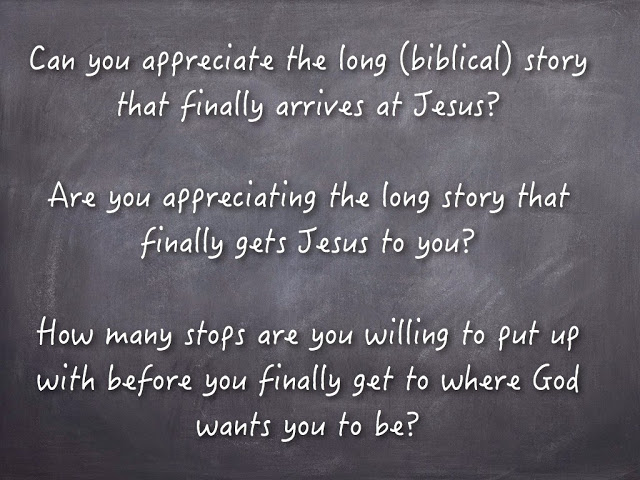
by Jonathan Manafo | May 20, 2015 | Sunday Conversations
There are some stories worth repeating – we would agree that the good stories should be retold over and over again. You’ve probably been at a party and one of friends said to another, “Hey man (or girl), you gotta tell everybody that story about _______”. As they proceed to share it, you wish you had a story as good to share.
 Good stories have always been repeated. Good/Popular songs get played on the radio over and over, Good movies get watched, rented or downloaded more than other movies. And sitcoms or tv dramas show reruns for years to come.
Good stories have always been repeated. Good/Popular songs get played on the radio over and over, Good movies get watched, rented or downloaded more than other movies. And sitcoms or tv dramas show reruns for years to come.
For example, the Beatles song, ‘Yesterday’ has been played more than 7 million times on the radio (this doesn’t count the internet play it gets). Seinfeld has made more $3 billion in repeat fees (and 1/2 of that went to Jerry:). Starwars IV (the first to come out) is the 2nd most watched movie on TV reruns.
If you take the time to read through the whole book of Acts (as we at The Village have been adventurous enough to do), you’ll notice that one story gets repeated a few times. The story I’m referring to is Paul’s conversion. As Luke lays out what makes it into his second volume (his gospel being his first volume), he chooses to include Paul’s conversion story three times. Acts 9, 22 and 26. They’re all basically the same, but set in a different context. In Acts 9 we find out that this Pharisee who was responsible for Stephen’s death just a couple of chapters before has had a complete transformation. In Acts 22, Paul is defending himself from some accusations (which is a normal thing for Paul). In Acts 26 Paul is once again defending himself, and in this current hearing with King Agrippa begins to share who he used to be (a fundamental religious Pharisee) and how he became a follower of Jesus who is now called to share this new gospel with the world.
We enter this scene with Governor Festus trying to figure out if Paul should be convicted of anything or if he should be let go. He’s been accused of blasphemy from the Jews. Festus welcomes King Agrippa and his sister Bernice to be part of the discussion and perhaps write a letter to Caesar to be sent with Paul.
With King Agrippa wanting to hear from Paul, Paul takes this opportunity to share his (conversion) story (Acts 26). Here are the parts of his story that Luke wants us to hear…again…
Paul ‘used to be’ obsessed with putting an end to the early church movement. He was instrumental in putting Jesus’ followers in prison, and of course ensuring that many of them would die. Think about the things people are ‘obsessed’ with today: sports, gaming, netflix, etc. Paul’s obsession was watching early Christians being stoned (Acts 7). But something clicked in Paul – he realized that the hope he had in God was fully realized in Jesus. The people he was trying to stop were the ones who discovered God’s hope for real – Jesus. Paul couldn’t get past Jesus, until of course Jesus got his attention.
In Acts 26:12-18, Paul shares the heart of his conversion story. He tells us that Jesus got his attention, Jesus woke him up, knocked him off his horse (literally). In Paul’s conversion we see three things that change with Jesus: blind eyes are opened, darkness turns into light, and we are no longer are under Satan’s power, but God’s.
When you look closely, Paul’s story is more about ‘calling’ than it is about ‘conversion’. It’s clear that God didn’t get Paul’s attention simply for him to change churches…or synagogues, he changed him so that Paul could make a difference and share this story with the world. Jesus never saves us to sit, he saves us to serve. Paul’s big moment on that Damascus road turned into so many more moments where God used him.
How about you? Has God’s transformation in your life given you the desire to put a towel over your arm and serve? As grateful as you are and should be about God’s forgiveness and grace, have you allowed Him to turn your conversion into a calling? What are you called to? Who are you called to?
This last part of Acts 26 may be my favourtite. First, Festus tries to say that Paul is crazy. In Paul’s return comments, he appeals to King Agrippa and asks if he believes. King Agrippa’s response is humourous. Here’s the exchange…
Agrippa says, “Do you think that in such a short time you will persuade me to be a Christian?”
Paul’s answer is classic, “short time or long I pray to God that you and all who are listening to me today may become what I am, except for these chains”. (love the inclusion and joke about the chains)
After all that Paul has gone through to get a ticket to Rome, he potentially blows it with this comment. Why? Because he really does believe in what he’s preaching. He really does want people to discover Jesus as Lord. He really does believe that everyone needs God. So he sees an opportunity to lead a King to ‘The King’, and he takes it and makes the most of it.
From what we see in Acts, Paul probably used his story many times. He wanted others to find God too. He wanted others to be awoken to who Jesus was and is.
Here are a few questions to think about…
– What
did…or is…God saving you from?
What
is…God calling you to?
– What
stories are you keeping to yourselves?
What story should you
be sharing?
– If
you’ve got no moment to look back on…no turning point…how about asking
God to get your attention…whatever way he needs to get it?
– – – – – – – – – – – – – – – – – – – – – – – – –
small(er) group questions:
What’s one thing you say about your self over and over again? A trait you think describes you well that something people would like to know?
What’s one movie or show that you can watch over and over and not get sick of?
Paul talks a lot about who he used to be. Is there a past part of you that your thankful is now in the past? You feel like sharing?
We tend to think that Jesus stands at our door knocking and won’t come in unless we open the door. (I think Rev 3:20 lends itself to that) However, what do we make then of Paul’s experience. It seem like Jesus barged into that door. He got Paul’s attention. He woke him up.
– Is it one or the other…or both/and?
God’s desire seems to be two-fold: He wants to change us and he wants to use us. How long does it take to go from step 1 to step 2? Or can God use us while we’re still ‘becoming’ Christians…while the change is still in progress?
Paul took a risk in answering King Agrippa the way he did (Acts 26:28-29). What was it about Paul that gave him such confidence? Can we have a similar confidence while still being true to ourselves and not looking too fanatical in front of friends?
What do you need to be praying for tonight?

by Jonathan Manafo | May 12, 2015 | Sunday Conversations

I was 19 years old when I headed off to University. I was presently living in Montreal and would be spending the next 4 years in Peterborough. Before heading off I agreed to play with a band for an important event that would happen that October. This meant traveling back (for rehearsals) home on weekends leading up to the event. I purchased a multipack of bus tickets and was excited for the event and for the rides. Little did I know that what I thought would be a 5 hour trip, turned into over 7 hours each and every time. That’s long. Why? Because this bus stopped at (what felt like) every town along the way. And if that wasn’t enough, I had to make a transfer in Ottawa before finally getting on the homestretch to Montreal. Those felt like the longest trips ever, not because of the distance, but because of the stops along the way. Years later I would take a train to Sudbury that felt equally as long. Why? Same reason – all the stops along the way.
As we head into this homestretch in Acts we are realizing that Paul’s road to Rome is taking forever. So many stops along the way. Unlike small towns with bad restaurants (like the ones on Hwy 7 to Montreal), Paul’s stops include death threats and hearings and clever speeches to get him out of trouble.
After hearing from Jesus (Acts 23:11) that he will testify in Rome, Paul is made aware of a conspiracy to end his life. Forty Jews have vowed to not eat or drink until Paul is dead. (Acts 23:12ff)
Not sure if any of us can relate to this? I’ve had people not like me, and perhaps some even played some pranks to make my life a little miserable. But this conspiracy is serious. Hockey players vow to not shave until they win the Stanley Cup – these Jews were determined to fast until they got what they wanted, Paul’s dead body.
Paul escapes this present obstacle in a surprising way. We don’t read much of anything about Paul’s family in the NT, but in this text we read that his nephew warns Paul about what’s going on, and that his nephew makes the Roman commander in charge of Paul aware of this situation.
What transpires next is very cool. In order for Paul to have a fair hearing, the commander orders that Paul be escorted by 470 men (to Caesarea). This was so the people who wanted to harm Paul would not be able to get through. The text says there were 200 soldiers, 70 horsemen and 200 spearmen. That seems a lot more elaborate than any witness protection program I’ve watched in the movies.
Felix, the governor, makes this hearing a reality. They bring together both sides of the story: The Jews (who are accusing Paul of blasphemy and stirring up trouble) and Paul (who says he’s done nothing wrong, if anything, he’s simply helping people continue on the ‘God’ road they’re already on, just pointing out that Jesus is the adjoining road). The interaction in Acts 24 is worth reading. Paul is his usual clever self. He uses two terms that are important for us to note: The Way & Resurrection.
– The Way is what the early followers of Jesus were called. Paul and the early church have come to realize that Jesus is the WAY (like we read about in John 14) and that the path the Jews have followed up until now is fulfilled in Jesus, not halted by him.
– Resurrection is a common denominator Paul would like to use to bridge his Jewish family and his Christian family. Jews believed in resurrection, but they had a hard time believing that Jesus’ resurrection was the beginning and the initiation of our own. His resurrected life was the sign of hope for the world. Paul desperately wanted everyone to know that, especially these Jews.
One more stop for Paul in this (long) section of Acts. There’s a leadership change, from Felix to Festus (not brothers). In Paul’s exchange with Festus, he appeals to have a meeting with Caesar himself. This is the highest hearing Pau could get, but it’s also his way to get to Rome. Caesar doesn’t come to you, you go to him, and he is…in Rome.
Here are some things to be thinking about in response to this text…
– – – – – – – – – – – – – – – – – – – – – – – – – – – – –
small(er) group questions:
Can you share any travel stories? Ones about trips that just took forever because of all the stops along the way?
Paul is on a mission to get to Rome, yet he can’t seem to get there without obstacles and trouble. How do the words in Acts 9:15-16 & Matthew 10:16-20 help us understand this better?
Should we, today, in 2015, expect any of these kinds or other road blocks in our journey with and for Jesus? Is there ‘good’ trouble to get into while following Jesus?
The early church were called ‘people of the way’. How would you describe our church community or the church in 2015? What kind of phrase or word would do us justice?
A helpful analogy to see why Paul is so keen on pointing people to Jesus is this: If we look at God’s story through a camera lens, we should have Jesus as our focus, and everything else in the picture is there to point us to the focal point. Is that helpful when it comes to putting the OT and NT in it’s proper context? Why is Jesus the focal point?
Before you close up tonight, if you still have time, try and discuss some or one of the questions from the above picture…
– Can
you appreciate the long story that finally arrives at Jesus?
– Are
you appreciating the long story that finally gets Jesus to you?
– How
many stops along the way are you willing to put up with before you get to where
God wants you to be?

by Jonathan Manafo | May 6, 2015 | Sunday Conversations
I recently found out that a friend of mine is moving back to his home town of Montreal. I met Dom when we were kids. I was in my teens and he was just getting to his teens. He was a hockey & music fanatic (and still is). We met because his mom and brother began coming to the church I was a part of. It was amazing to see his transformation, along with many other people in his family.

I got to watch and observe Dom’s journey. After completing a music diploma he went to a theology school to prepare for pastoral work. One of his summer internships was spent at a church I was then serving in Toronto. That summer was both wonderful and tough. Wonderful because we got to spend time together, tough because he was in a season of serious doubt and scepticism. For months afterward he worked through many questions that eventually made his faith stronger. His life & work brought him to Sarnia, Calgary, London, another place in London and then Sarnia (again). During that time he finished a Masters Degree and a PhD. He’s become quite the teacher. Today he and his family are moving back to Montreal. That’s right, full circle. They will be preparing to plant a church in Canada’s most diverse, beautiful and spiritually tough cities.
It seems like his whole life was leading him back to this – back to where his heart is. God was seemingly always going to get him there – back to Montreal.

As we enter into the book of Acts again, we engage the story with Paul once again on the ropes. Paul is often getting himself in trouble because he’s sharing a message of grace to people who’s religion is based on work and sacrifice. This little sentence in Acts 22:21 sets of the Jews (again). “The the Lord said to me, Go, I will send you far away to the gentiles”. For Paul this meant Rome, for the Jews this meant more grace to (undeserving) people. Lot’s is happening in Acts 22:21-23:11. Paul seems to always be on the brink of death. Here he will ‘almost be’ flogged (interrogated via serious pain) for information. But one thing saves him, his birth certificate – his past. Before the Roman officials begin the flogging process to find out why the Jews are so mad at him, Paul pulls the Roman card. What’s that? Paul is a Roman citizen, not by application or by payment, but by birth. The Roman officials realize that they can’t be flogging Paul, if they did they’d be in real trouble. You couldn’t do that to Roman citizens. Delayed again…Paul’s newest potential persecution/pain is delayed because of his past – his heritage – his hometown if you will.
A few other things happen too: Paul accuses a High Priest of being a hypocrite, apologizes for it, and stirs up an argument between Pharisees and Sadducees (based on their differing views on resurrection). All strategic moves on his part.
This section of Acts ends with one very important word from Jesus. “The following night, the Lord stood near Paul and said, ‘Take courage! As you have testified about me in Jerusalem, you must also testify in Rome.'”
Paul’s mission was clear, he was going to get to Rome. God’s intention was for Paul to get there. Why there and why Paul? The rest of Acts will answer this, but for now we know this: Paul was the guy to get there and share Jesus’ message of grace to Gentiles. God uses Paul, a hometown guy if you will, to let Rome know that Jesus is real and that they can follow him too.
Paul’s history was about to be used for his future. Paul’s birth certificate was more than a sign of his citizenship, rather it would be a tool to share the greatest story ever to the most influential society of the first century. God uses Paul’s past to save him from his present dilemma and launch him into his future. He will get to Rome, to the place God wants him to be, even if the road is a tough one.
This story begs these questions…
– What
part of your past can you be grateful for? How can God use it today?
– Even
though you’re not there yet, can you believe that God’s working on your future?
– – – – – – – – – – – – – – – – – – – – – – – – –
small(er) group questions
– Many people have parts of their past they would like to forget. It’s understandable. What part of yours do you look back on as a stepping stone to your future…to where you are right now…to what God is doing in you and through you?
– If there was one person or place you’d like to go back to and share the gospel story with (Jesus’ message of grace & life), who would it be, where would it be? Why?
(this can be an old friend, a place you lived…)
– What are some things ‘WE’ want, that ‘WE’ may have convinced ourselves God wants for us, that perhaps are not God’s will or desire for us at all?
(after answering that)
– Is there a dream or place or outcome or mission that you feel God has placed in your heart, that even though you’re not there yet, you will not give up on any time soon? (Phil 1:6)
Missional Component for your group:
– Is there an activity or serving opportunity that your group can dream up? Something to do or someway to serve together, before the summer hits? Maybe something to think about for the fall season as well?
by Jonathan Manafo | Apr 29, 2015 | Sunday Conversations
Growing up I quickly realized how much I enjoy food. Not just any kind of food, but some unique things that we would eat in our home. My afters school snack was either some regular ripple chips with red wine vinegar sprinkled (poured) over top or provolone cheese dipped in fresh home made tomato sauced (uncooked) with some olive oil added. Sounds crazy, but it was so good. Something my twin brother and I would fight over were bonconini. We both loved that soft cheese. The best way to eat it was to put a few in a dish, sprinkle salt over top and then peel the cheese apart.
I’m a big fan of how salt makes things taste like. I know that it’s not ‘that’ good for you if you have some heart issues, but a little salt on things like fresh cut fries or eggs or, my favourite, bonconcini, just tastes great. I guess I’m a big fan of flavourful food…any kind. I mean, what would our world be like without flavour? I’ll tell you what – bland.
Amongst the many things Jesus is calling his followers to be, one thing is for sure, he wants us to add flavour to our world. Jesus not only spices up our lives, but he calls us to do the same for others.
In Matthew 5, as Jesus continues his hill side sermon introduction, he moves from character traits (Beatitudes) to metaphors. He first tells his disciples that they should be humble, meek, pure of heart, producers of peace, etc. But Jesus doesn’t stop there, he continues to show us what kind of people he is calling us to be, this time by telling us to be salt and light.
You are the Salt of the earth.
You are the Light of the world.
Think about the decay and corruption we see; the dark places in our communities, cities, governments; to those places, Jesus says, be Salt & Light!
Why Salt? Why Light?
“You are the salt of the earth. But if the salt loses its saltiness, how can it be made salty again? It is no longer good for anything, except to be thrown out and trampled on.”
Jesus starts with confidence and grace. He doesn’t ask or invite his disciples to be salt, he tells them, ‘this is what/who you are’. Even if they don’t know it or think it or feel it yet.
Salt was very valuable in ancient times. (it still is) The Romans paid their soldiers with salt, the Greeks called it divine, at times is was referred to as ‘white gold’. Its value was in its power to preserve. It stops meat and other foods from decaying. It also adds flavour to the food we eat.
Jesus uses this metaphor to teach his disciples the role they have as followers of him in the world – to add flavour, and especially, to be a defence towards things that are decaying and corroding.
Paul adds another dimension to the salt metaphor. In Colossians 4:5-6 he says, “…make the most of every opportunity, let your conversation always be full of grace, seasoned with salt.” This may be just me reading into the metaphor, however, I can’t help but think about how bad something tastes when there’s too much salt. So as followers of Jesus, let’s discern how much salt to add. If we don’t use any, then life is bland, but if we add too much, people won’t be able to taste how good the food God is serving.
“You are a the light of the world. A city built on a hill cannot be hidden. Neither do people light a lamp and put it under a bowl. Instead they put it on its stand, and it gives light to everyone in the house. In the same way, let your light shine before others, that they may see your good deeds and glorify your Father in heaven.”
What’s amazing about this is that Jesus is the Light of the World (John 8:12). He is commissioning us to be his light in a dark world. Jesus entrusts us? To be light? (Ephesians 5:8).
Jerusalem was the city that was supposed to shine brightly. Jesus is trying to let us know that his light isn’t stuck to a location, it’s stuck to us. We are mobile flashlights, taking his light everywhere we go. Where his church goes, the light goes.
What does light do? It helps us see where we’ve gone wrong…and it helps us see where to go next. Tim Keller puts it this way, “…because there are dark places in the world, Jesus wants us to be light in those dark places…and because our culture is in decay, we can be a preservative, restoring a broken world. Being salt and light shows the world how to be the right kind of human.”
The reason we call the first 16 verses of Matthew 5 Jesus’ introduction to his hill side sermon is because what follows is example after example of how and where we can live out our saltiness and light. (Matthew 5-7)
Being Light and Salt in a dark and bland world will stir up curiosity. Living this kind of life (Beatitudes and all) is bound to get people asking questions. And isn’t that precisely the point? Jesus wants us to live in such a way that causes people to ask about the hope that we have in him. (read this verse from 1 Peter)
The early church didn’t win people to Jesus by passing out tracks (one more reason why I’ve never been into things like that), they led people to Jesus by how they lived, how they loved, how they cared, for themselves and those who weren’t even part of their community. That kind of radical love and life gave the Roman Empire fits. Don’t you wanna live that way? Don’t you want to live and act in such a way that has people so puzzled about your goodness and grace they can’t help but ask why you live the way you do?
I think Eugene Peterson’s rendition of Matthew 5:13-16 says it best. Read it as a challenge and as a prayer to do the same…
“Let me tell you why you are here. You’re here to be salt-seasoning that brings out the God-flavors of this earth. If you lose your saltiness, how will people taste godliness? You’ve lost your usefulness and will end up in the garbage. “Here’s another way to put it: You’re here to be light, bringing out the God-colors in the world. God is not a secret to be kept. We’re going public with this, as public as a city on a hill. If I make you light-bearers, you don’t think I’m going to hide you under a bucket, do you? I’m putting you on a light stand. Now that I’ve put you there on a hilltop, on a light stand—shine! Keep open house; be generous with your lives. By opening up to others, you’ll prompt people to open up with God, this generous Father in heaven.
– – – – – – – – – – – – – – – – – – – – – – – – – – – – – –
small(er) group questions:
These words from Jesus follow the Beatitudes. How do you feel the Beatitudes connect with or are related to Salt & Light?
Can you think of things in our world that represent decay or darkness?
Salt’s two main purposes are to ‘preserve’ and the add ‘flavour’. How does a follower of Jesus go about doing that?
How do Paul’s words in Colossians 4:5 help us better understand Jesus’ commission to be salt?
“…make the most of every opportunity, let your conversation always be full of grace, seasoned with salt.”
– what opportunities do you think Paul is talking about? have you had any? what would they look like? How would you describe ‘seasoning’ in a personal context?
(1 Peter 3:15 is a good cross reference for this)
Jesus’ commission for us to be light is profound in that He is already the light of the world. How do you feel about him asking us to be?
– Does this mean we have to be perfect?
– How can we be his light, even in our brokenness?
Read Matthew 5:13-16 again, in the message (above). What are some of your final thoughts or reflections about this text?
Pray in light of tonight’s theme. For opportunity for God to use you in the way Jesus was talking about.

by Jonathan Manafo | Apr 22, 2015 | Sunday Conversations
A friend of mine once tried to teach me how to waterski. It was a Sunday afternoon, on his family cottage lake. This friend, we’ll call him Kyle, takes pride in his instructional skills. Kyle thinks that everyone should know what it feels like to waterski…even guys like me who in 40 years of their lives and never done so. He warned me it might hurt a day later and that I might fall a few times, and still… I still agreed to this. He reiterated this one bit of instruction over and over again: Don’t try and pull yourself forward, simply lean back and you’ll move forward. This defies logic to us non-waterskiing types. After numerous falls into the lake, some moments hurting more and some less, I actually was up, skiing, for several seconds, until of course I got nervous, began to pull my self forward and wiped out again. But for those few seconds I did it – I waterskied. I leaned back in order to move forward.

Jesus’ teaching about finding or discovering life is very similar. We want to make things happen and pull ourselves forward, but Jesus says, in various ways, with various metaphors, that we must somehow think in reverse for us to move forward. The Beatitudes (Matthew 5) may be the best example of what he’s trying to convey.
When you encounter the teaching of Jesus, you’re either compelled because of its profound power or you’re scared because of how it reaches deep into your soul and touches buttons that you didn’t know you had.
In Matthew 5 we get what is probably the longest recorded block of Jesus’ teaching. He sits at the side of a hill, with a crowd close by and his disciples even closer, and begins to teach on an array of topics: Relationships, Trust, Generosity, Anger, Worry, etc. He starts off these hillside chats (or sermon on the mount) with what has been called ‘The Beatitudes’ – 8 sayings, principals, guidelines, to move forward in God’s Kingdom.
The Beatitudes are the foundation of everything that follows in Jesus’ sermon. It’s like he’s laying an under pad before installing the flooring – it will ensure that the steps we take will be solid, not lose or unbalanced.
Jesus is wanting to pull us forward; to lead us into a new way of life that is by far better than any life we can have without him. The Beatitudes may best represent Jesus way of moving us forward by looking at things in reverse. He tells us that a blessed life comes from poor spirits, grieving souls, meek characters, pure hearts, and the persecuted. In many ways, Jesus is saying to us, look, take note of the way this kind of person lives, if you you want what they have (the kingdom of heaven, the earth, a full life, mercy) then you’ll want to live like they live.
Let’s take a closer look…
Blessed are the poor in spirit…for theirs is the kingdom of heaven
A poor spirit isn’t something to look down on, but a posture to work towards. Why? Because to be poor in spirit is not to lack courage, but to acknowledge spiritual bankruptcy. When we arrive at that conclusion, we will finally realize that we ‘really’ need God.
This is also Jesus’ sly way of announcing that God doesn’t play favourites. God’s kingdom and life can’t be earned or bought, it’s given to those humble enough to receive it.
Blessed are those who mourn…for they will be comforted
Why is Jesus looking for people who grieve? Because those who grieve have hearts that drip with compassion for broken things and broken people. Some say that the ‘mourning’ Jesus is referring to is the weeping over Israel’s complacency. Found in verses like Psalm 119:136, “Streams of tears flow from my eyes, for your law is not obeyed.” Jesus is looking for people with a heart that hurts for others.
One thing we know for sure, those who are grieving will not be forgotten, but instead, comforted.
Blessed are the meek…they will inherit the earth
The word ‘meek’ which is not used too often these days, generally suggests gentleness, humility and self-control. This is a characteristic our world is lacking. Put up your hand if you’d like to see more gentleness and humility.
The meek also have a quiet faith and trust in God – they go to him again and again, trusting that He’s the first and last place to go.
Blessed are those who hunger and thirst after righteousness…they will be filled
I can’t help but think of my favourite food. What’s yours? Mine is Pasta. I grew up in an Italian home, so when I think of the Beatles song, 8 days a week, I think of Pasta. I could eat it everyday and not get sick of it. Jesus says that our favourite food or what we should crave and hunger for is Righteousness. He’s talking about two things:
Justice – Do we hunger and thirst for things to be better; for things to be made right?
God – Do we hunger and thirst for God; for his character, his love, his grace. Psalm 42 & 63 says, “My soul thirsts for the living God” When we get a taste of Him, we’ll want more and more.
Blessed are the pure in heart…they will see God
This beatitude sounds simple, but it packs a punch, referring both to how we live as well as our commitment to God’s Kingdom. Proverbs 4:23 says, “Above all else guard your heart, for everything you do flows from it (it is the well-spring of life).” Jesus reiterates this in Matthew 15 while saying, “…the things that come out of a person’s mouth come from their heart…”
Why is this so important? Because our attitude and behaviour is driven from what’s going on inside. Jesus knows this and challenges us to guard our hearts.
Blessed are the merciful…they will be shown mercy
Jesus teaches us that ‘feeling mercy for someone’ and ‘showing mercy to someone’ are two very different things. The difference being, “I feel so bad for them” vs “What can I do for them”. Being merciful is the ultimate expression of compassion. It’s connected to God’s mercy towards us. We read Jesus’ words in Matthew 18, “…should you not have mercy on your fellow slave…as I had mercy on you”.
Those who are merciful don’t judge people for their sin, rather they identify with their neighbours struggles and attempt to show mercy as God shows us mercy.
Blessed are the peacemakers…they will be called children of God
These words from Jesus possibly require the most action. Jesus is looking for makers of peace – producers of reconciliation. How much does the world need this? In light of recent events (ISIS, Middle East), peace is a much sought after commodity. Jesus is prophesied by Isaiah to be the Prince of Peace. And he’s asking us to follow in the family business. No matter what our day job is, we are disguised as Peace Makers.
Jesus says that these people will be called children of God. In that case, Peace Making runs in the family. It’s a family trait. It should be what followers of Jesus (children of God) are known for.
Blessed are those who are persecuted for righteousness…theirs is the kingdom of heaven
Jesus leaves the toughest for the end. Really Jesus? Blessed are the persecuted? That’s a hard pill to swallow. But if we follow what he says it’ll make more sense. Take a glance through Jesus’ life and subsequently, the church, his body, that grows out of Jesus life, and we’ll see that opposition is a normal mark of a disciple. We find these words in 1 Peter 3:14, “But even if you should suffer for what is right, you are blessed.”
Because Jesus knows that this is a tough one to follow, he gives some further explanation. Listen to how The Message paraphrases Matthew 5:11-12,
“Not only that—count yourselves blessed every time people put
you down or throw you out or speak lies about you to discredit me. What it
means is that the truth is too close for comfort and they are uncomfortable.
You can be glad when that happens—give a cheer, even!—for though they don’t
like it, I do! And all heaven applauds. And know that you are in good
company. My prophets and witnesses have always gotten into this kind of
trouble.”
Jesus says that if we suffer for doing good, we are in good company. Think about anyone in history that made a difference in our world, they probably suffered or met resistance or hit a few walls along the way. Encountering resistance means you’re on the right side – you’re doing something good. Jesus says that he encountered it and so would we.
I don’t know about you, but I want my life to count for something. I want to be in the company of people who follow Jesus, do good, show mercy, work for peace…no matter what the cost. Even though on the surface it may look like they not making up ground, their lives have accomplished much more.
That’s what Jesus is saying in the Beatitudes. It may look like, in comparison with our world or society, that we’re in reverse, but we’re actually gaining ground. Don’t pull yourself forward on the water skies, lean back and see how far you’ll get.
– – – – – – – – – – – – – – – – – – – – – – – – – – – –
The Beatitude force us to ask questions about identity. Who we are? Who we are becoming? What our lives will count for?
How can we resist values that lead nowhere and instead, embrace Jesus’ values that lead to…
– the kingdom of heaven for the poor
– comfort for those who mourn
– the earth for the meek
– a vision of God for the pure in heart
– a full stomach of righteousness
– mercy shown & mercy received
– being in the family ‘PEACE’ business
– being in good company, even if it ruffles my feathers
– – – – – – – – – – – – – – – – – – – – – – – – – – – –
small(er) group questions:
Welcome back!!!
Can you think of an example where the solution to your problem was totally different than you logically thought it could be? What would that be? Any stories?
Take some time to read through Matthew 5:1-12.
Which Beatitude resonates most with you and/or which one might you have a bit of an issue or problem with?
Focus on at least 3 in your group discussion.
For example:
– After reading what it means to be poor in spirit, how can this be a positive in your life or the life of a close friend?
– In regards to Jesus wanting us to have a pure heart, why is a verse like Proverbs 4:23 so important?
– No matter what we do for a living, how can ‘peacemakers’ be our part-time work? What are some creative ways of producing peace or reconciliation?
– Do you struggle with Jesus’ last Beatitude?
How are the Beatitudes Jesus’ reverse way of moving us forward? Why do you think the main question that arises is about our identity – who we are?

 Good stories have always been repeated. Good/Popular songs get played on the radio over and over, Good movies get watched, rented or downloaded more than other movies. And sitcoms or tv dramas show reruns for years to come.
Good stories have always been repeated. Good/Popular songs get played on the radio over and over, Good movies get watched, rented or downloaded more than other movies. And sitcoms or tv dramas show reruns for years to come.








